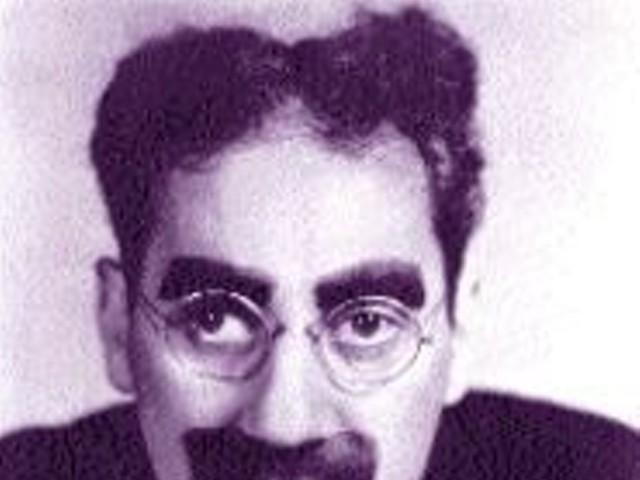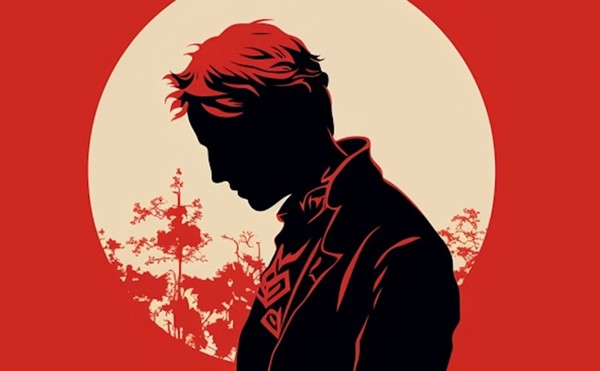"By ten to six he had finished setting the table. He rubbed his hands, quite pleased with the results of his efforts. For the main dishes, there were chunks of pork stomach on a bed of green napa, thin slices of smoked carp spread on fragile leaves of jicai, and steamed peeled shrimp with tomato sauce. There was also a platter of eels with scallions and ginger, which he had ordered from a restaurant. He had opened a can of Meiling steamed pork, and added some green vegetables to it to make another dish. On the side, he placed a small dish of sliced tomatoes, and another of cucumbers. When the guests arrived, a soup would be made from the juice of the canned pork and canned pickle.
"He was selecting a pot in which to warm the Shaoxing wine when the doorbell rang."
Few, if any, fictional detectives are known for their devotion to the kitchen gods. Imagine Philip Marlowe tying on an apron and setting up a spread like that. V.I. Warshawski sure as hell doesn't have time for domestic chores. If any scholar were to take on the subject of "Food and the Modern Detective," the classic image would be that of Steve McQueen in Bullitt, shopping in the supermarket, selecting a different TV dinner for each night of the week.
And with big Steve in mind, don't expect any chase scenes -- for the most part, the unglamorous Chen either takes the bus or walks. He walks to help himself contemplate the complex case in which he finds himself enmeshed, which is accompanied by discomforting political pressures, but more often than not, as he walks, what comes to mind are a few apt lines from Chinese poetry. After he and Detective Yu Guangming discuss a lead in the case -- over a repast of smoked fish head, squid and beer (nothing seems to distract Chen from his appetite, and in Qiu's narrative design, food always takes precedent over plot) -- Chen is reminded of a Tang-dynasty poem: "This door, this day/-- Last year, your blushing face,/And the blushing faces/Of the peach blossoms reflecting/ Yours. This door, this day -- this year, where are you,/You, in the peach blossoms?/The peach blossoms still/here, giggling/At the spring breeze."
Poetry of the West intrudes on Chen's detective musings as well -- "Dover Beach" appears at one point, with an allusion to Derrida, no less -- which is another central, and atypical, quirk of this sleuth's. Chen is a translator of T.S. Eliot, along with other modernist poets, and is as renowned for his own poetry in Chinese literary circles as he is for his reputation as a good cop in an unjust system.
Chen is polite, never threatens with muscle or gets in anyone's face. When he's told he needs to supply a proper request to trace the phone number of a prime suspect, he dutifully supplies it. No doors are busted down or heads busted in. No dames used and tossed away like yesterday's party slogan. Chen encounters a prostitute during his investigation and treats her with a gallantry that would have Mickey Spillane turning in his grave. Even some of Chen's associates find him somewhat archaic. A repeated refrain he hears is "This is the '90s."
Author Qiu is as unpretentious as his literary invention, with whom he shares numerous character traits. Qiu is an accomplished poet and, like Chen, was a member of the prestigious Chinese Writers Association in his native Shanghai, where Red Heroine is set. He has translated Eliot, Yeats and other modernist poets into Chinese. And like Chen, he feels himself an outsider in the global economic boom that is radically transforming the People's Republic and his adopted home. "In China, some of my friends who were writers, too, they are surprised that I'm still writing," says Qiu. "They became businessmen. They make money. They go to expensive restaurants. They're involved in fashion. I'm in the United States, and I'm still writing.
"You realize you have to make a living, but you don't want to give up writing. But others say writing is just a joke."
Food's important, too. Qiu chooses a Chinese restaurant on Olive Boulevard to talk about his book. Along with the individual lunch specials, he orders a large fried flounder to share. When it arrives, he spoons large portions onto his guest's plate. "I must save face," he laughs.
Poet Qiu chose the novel form to explore the enormous social and political changes he has witnessed in his homeland since he began returning there on a regular basis in 1995. "One of the reasons I started writing this book was because this type of dramatic change -- you can call it 'best of times, worst of times' -- I found poetry is a good vehicle for my own feelings, but if you want to describe this kind of dramatic social change, maybe the novel is the best vehicle in that sense."
The mystery genre was also a calculated strategy, offering the lyric poet, writing in his second language, "a ready-made framework. I had never written a novel before, so if I wanted to write another kind of story, I may have to struggle, but with the mystery, it's relatively easy. It's just a beginning and an end -- you solve the mystery."
Red Heroine is far more complex than Qiu's offhand outline. When the novel begins, Chen, with the title of "chief inspector" and the acquisition of his modern apartment, has attained a level of status uncommon in the "classless" People's Republic. But with the discovery of a woman's body in a distant canal, Chen enters into an investigation that forces him to see a China his comfort had granted him the privilege to ignore. Red Heroine follows a peeling-the- onion narrative as Chen follows the murder trail from the polluted canal to the mansions of exalted party leaders' families. Through the vehicle of the detective's investigation, Qiu describes a People's Republic precariously stretched between the boom created by economic reforms and the stern ideological principles of the "old Bolsheviks."
More than to create a suspenseful whodunit, Qiu wrote Red Heroine to explore the old-socialist/new-capitalist tensions that currently are central to his rapidly evolving homeland. To better explain those tensions, Qiu's characters frequently refer to their relationship to the epochal event of recent Chinese history, the disastrous Cultural Revolution (1966-76), Chairman Mao's great social experiment, which closed schools and all elements of modernization and sent the youth of China into the countryside to rediscover true socialism working alongside rural peasants. "I know there are some books about the Cultural Revolution in English written by Chinese authors," Qiu admits. "Even so, I don't think that is a topic that has been really explored. In China, people have written about it, but there are problems. It's a subject you have to write about most carefully.
"This book is written about contemporary China, but I still believe the problems and the phenomena -- a lot of things we can't really understand unless we have the cultural aspect, how and why people behave like this. In recent years, the one thing that is most noteworthy is how some people are just materialistic. But again, with the Cultural Revolution, people lost hope in politics. They do not believe in this kind of thing anymore.
"In the past, before the communists, people believed in Confucius. Then afterward, they believed in Mao. After Cultural Revolution, now what? Maybe the only thing they have is money -- that's most important. They believe in that. That is the cause of some problems."
Qiu compares the Cultural Revolution to the Holocaust in terms of the scope of its impact on those who were caught within it and the historical wake of its aftermath, which continues to be felt. "There was no escaping it," he reflects. Qiu was an elementary-school student when the revolution began. Schools were closed, and when they were reopened, the only text was Quotations from Chairman Mao, "the little red book." Qiu's family came under special scrutiny. His father owned a perfume business, which made him a criminal, a capitalist enemy of the people. While Qiu's father was recovering from eye surgery in a Shanghai hospital, he was removed by the police to appear before a people's court, standing for hours, his eyes bandaged, admitting his guilt beneath a portrait of Chairman Mao. The young Qiu was present, holding his father so he wouldn't collapse.
Fortunately, in retrospect, Qiu contracted bronchitis and so was allowed to remain in the city. With schools closed and with, literally, nothing to do, the enterprising youth taught himself English "on a bench by the Huangpu River." When schools reopened and calls for modernization became the new slogans, Qiu was ahead of many of his classmates, majoring in English and American literature. He came to Washington University in 1988 as a Ford Foundation fellow, choosing St. Louis because he was working on a book on Eliot.
Modern Chinese history consists of dramatic events, and in 1989 came another that would radically change the course of the country and Qiu's life -- the crackdown at Tiananmen Square. By chance, he was working at the VP Fair (now Fair St. Louis), selling egg rolls at a charity booth, when he overheard his name on a Voice of America broadcast, described as "a published poet who supported the democratic movement in China." From that moment, he knew a return home was risky. A month later, Qiu managed to bring his wife to America, an accomplishment -- given the political turmoil of the time -- that suggests real elements of mystery and suspense, of which Qiu only says, "It was difficult. We did everything possible. At that time, we did not know if there would be civil war."
Qiu says that the Tiananmen tragedy made him confront aspects of the People's Republic he had managed to neglect before -- again, not unlike his chief inspector. Qiu feels ambivalence toward China, as does Chen, one who sees not only the corruption that has tarnished the old ideals but the corruption of the new profiteers as well.
He's uncertain as to whether he would ever live in China again. Just the other day, he was talking with his editors. Red Heroine has been sold to publishers in France and Denmark, and now there are discussions with Taiwan. "They really want to push for it," Qiu explains; however, "if this book came out in Chinese, it could mean that I may never go back to China."
Like the cautious and poetic Chief Inspector Chen, Qiu's thinking about it.





